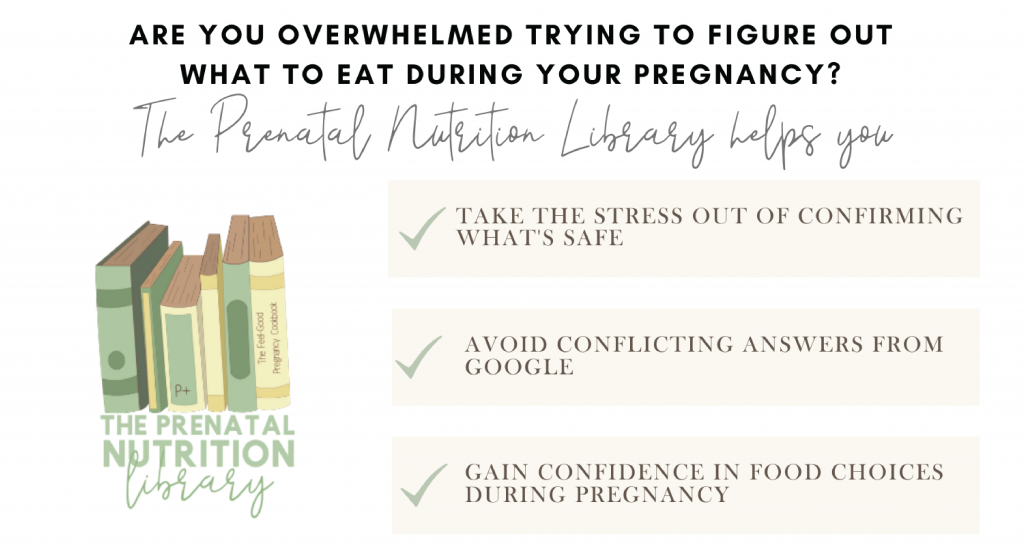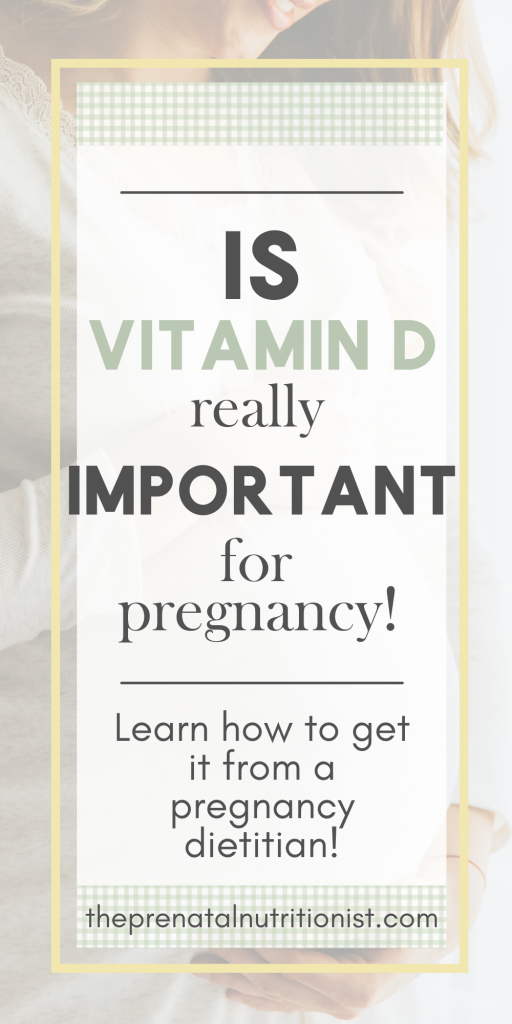
Vitamin D is one of the most important nutrients for pregnant women. It is essential for bone development and the overall development of a healthy baby.
Vitamin D helps your body absorb calcium which is essential for strong bones. This vitamin also plays a vital role in immune function and glucose metabolism.
Most pregnant women should aim for at least 600 IU (international units) of vitamin D each day, although most people will need more. Sunlight, food, and supplements are sources of vitamin D that make it easier to get as much of this essential vitamin as your body needs. Getting enough vitamin D during pregnancy is vital for your health, as well as the health of your growing baby.
If your body consistently doesn’t get enough vitamin D, it can become vitamin D deficient. The risks of vitamin D deficiency during pregnancy could include increased risk for complications with the baby’s growth and development, such as low birth weight and brittle bones. It could also be related to the risk of developing gestational diabetes and preeclampsia. Study results are mixed at this point.
Signs of vitamin D deficiency can be subtle initially, but there are many risk factors for developing vitamin D deficiency, so this is an important topic. You could be vitamin D deficient and have no symptoms, or you could experience irregular sleep, muscle aches, weakness, and more.
It’s also important to note many nutrients, such as vitamin A and magnesium, work synergistically with vitamin D, so a well-rounded diet that meets all nutrient needs is essential.
Read on to learn more about vitamin D during pregnancy to keep you and your baby happy and healthy.
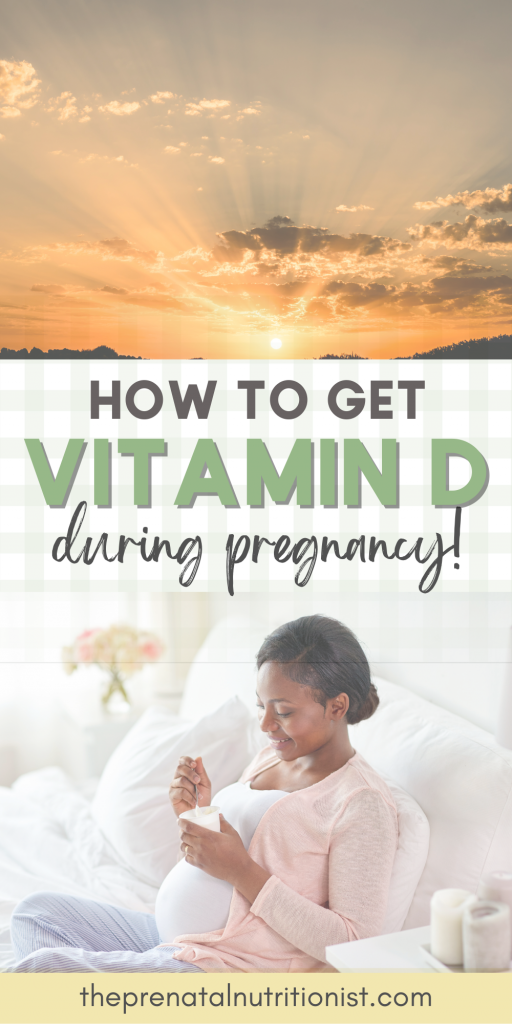
How to Get Vitamin D During Pregnancy
Vitamin D Supplements
Some prenatal vitamins contain around 400 to 600 IU (or more!) of vitamin D. For most people; it’s ideal to choose a prenatal vitamin that has at least this amount of vitamin D to help to provide enough of this essential vitamin, as well as other vitamins and minerals that are important for a healthy pregnancy. Although, some individuals may need additional vitamin D beyond what’s included in their prenatal vitamin!
Suppose your doctor checks your vitamin D levels, and you have vitamin D deficiency. In that case, your doctor or dietitian will likely have you take a supplement with a higher vitamin D dose during pregnancy. Likely even after pregnancy to ensure your body gets the nutrients it needs.
Spending Time Outside
The sun is a natural source of vitamin D; the best part is that it’s completely free! Your body creates vitamin D from sun exposure. Although some women, particularly those who live in areas with limited sunshine and women with darker skin, have a hard time getting enough.
Even though the sun is a natural source of this vitamin, it is still important to note outdoor safety. When spending more than 30 minutes outdoors, protecting your skin from the sun is important. Always wear sunscreen and appropriate clothing, and take care to stay hydrated.
Foods and Drinks
You won’t find large amounts of vitamin D in the foods and drinks you consume. However, it is possible to use food and drinks to help meet your daily requirements. By following a proper diet that contains foods rich in vitamin D and taking a daily prenatal vitamin, you can help ensure you are getting enough vitamin D every day. Some individuals may need additional vitamin D supplementation to meet their needs. This is individualized, and lab work is recommended.
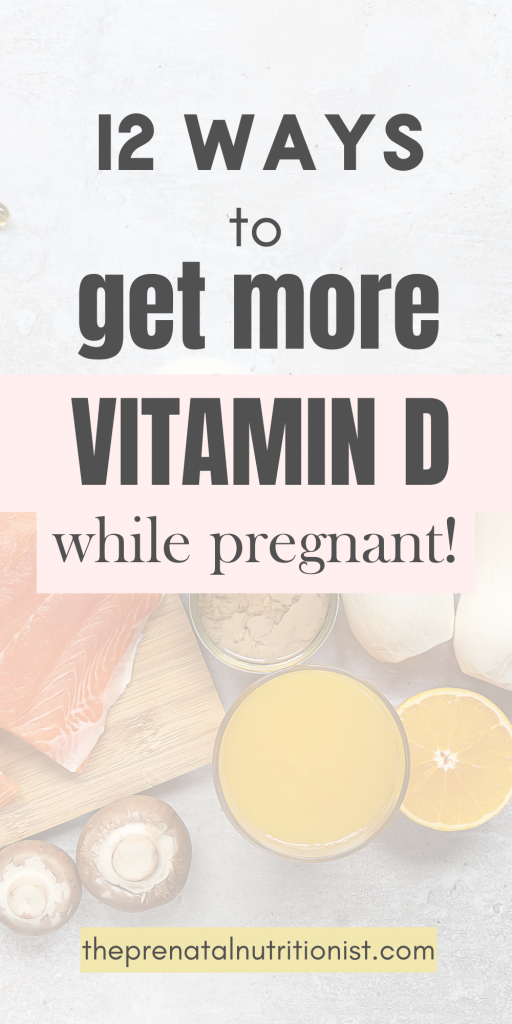
Food Sources of Vitamin D
Wild-Caught Salmon
Fatty fish like wild-caught salmon are loaded with health benefits, including a beneficial amount of vitamin D. Three ounces of cooked, wild-caught salmon contains about 447 IU of vitamin D. Salmon also contains omega-3 fatty acids that are great for fetal brain development.
Rainbow Trout
A 3-ounce portion of cooked rainbow trout has about 645 IU of vitamin D. That means just one serving of this nutritious fish provides more than 100% of an expecting mother’s recommended daily vitamin D intake. Like salmon, rainbow trout is loaded with omega-3 fatty acids.
Tuna Fish
A 3-ounce portion of light canned tuna has about 231 IU of vitamin D. There are various types of tuna. Canned skipjack tuna is an example of a low-mercury option that is an excellent choice for pregnancy. Ahi tuna is high in mercury and is recommended to avoid. Learn more about eating tuna during pregnancy here.
Fortified Milk
Fortified milk can be another great source of vitamin D. This includes non-dairy milk such as almond milk and coconut milk that have been fortified with vitamin D. A standard cup of 1% milk has 117 IU of vitamin D.
According to registered dietitian Anna Taylor, MS, RD, LD, CDE., “Since so few foods found in nature are good sources of vitamin D, fortified foods provide most of the vitamin D found in the American diet.”
While we encourage a focus on natural sources as much as possible, vitamin D is not found in many food sources. Fortified foods are specially made to provide additional nutrients. Most milk is fortified with vitamin D to help you get enough of the essential nutrient in your daily diet.
Cheese
Depending on what kind of cheese you eat, you could benefit from as much as 15 IU in a half-cup serving size. Add a slice of Monterey to your egg sandwich or sprinkle some over your salad to add to your total daily vitamin D intake.
Yogurt
Some brands of yogurt are another excellent source of vitamin D. A 6-ounce container of fortified yogurt contains about 85-90 IU of vitamin D. Fortified Greek-style yogurt includes an average of 60 IU per 5-ounce serving. Yogurt is also a great source of calcium and protein.
Mushrooms
Mushrooms are another decent source of vitamin D, as long as you choose the right ones. In fact, Mushrooms get their vitamin D from UV light, whether naturally or artificially. Please stick to the grocery stores when purchasing and eating mushrooms during pregnancy!
Eggs
Eggs are another great way to get more vitamin D in your diet. There are about 44 IU of vitamin D per egg. They also provide protein and choline, which help with your baby’s developing brain. Just be sure to eat the whole egg, yolk, and all to ensure maximum nutrition.
Fortified Breakfast Cereal
Is cereal the only thing sounding good to eat right now? When nausea and aversions hit, cereal can be a lifesaver! When choosing a breakfast cereal, selecting an option with some fiber and low-added sugar is ideal. Some cereals are fortified with vitamin D.
One cup of fortified wheat bran flakes has 145 IU of vitamin D. While fortified foods can be a good source of vitamin D, it’s ideal for focusing on natural sources such as eggs, liver, and sunlight to meet needs as much as possible.
Beef Liver
If you want more vitamin D in your diet, consider trying a serving of beef liver. This tender piece of meat is surprisingly delicious and loaded with nutrients that are needed in higher amounts during pregnancy. A 3-ounce serving of beef liver contains about 42 IU of vitamin D, and plenty of iron, protein, B12, and vitamin A. Liver is best consumed in moderation during pregnancy.
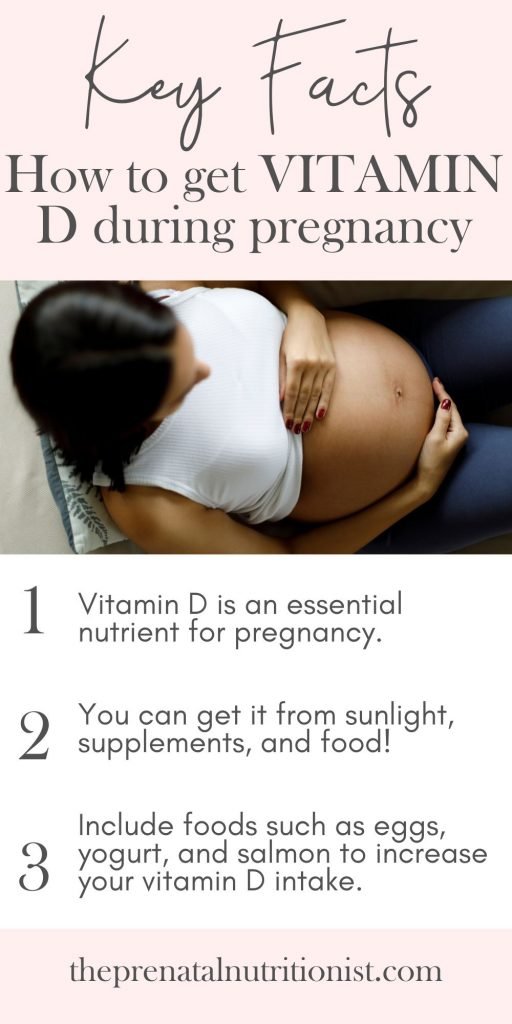
Are you getting enough Vitamin D during your pregnancy?
If you are concerned about the amount of vitamin D you’re getting during your pregnancy, talk to your care team and add one or more of the food mentioned above to your diet. I recommend checking your vitamin D levels if you’re trying to conceive or are currently pregnant. Your body and your baby will reap the benefits.
For more information on all things prenatal nutrition, head on over to our blog. Or even better, take the stress out of Googling your pregnancy nutrition questions and join our comprehensive library today!
The Prenatal Nutrition Library is a searchable database, so you will have peace of mind that what you eat during pregnancy is safe and nutritious. We have a complete guide on vitamin D + other nutrients inside the library too!
